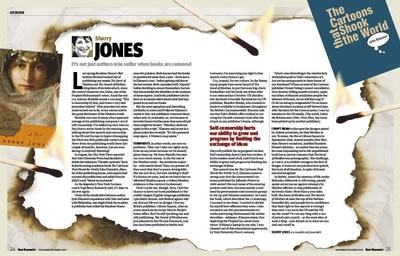 Last spring Random House’s Ballantine division backed out of publishing my novels The Jewel of Medina and The Sword of Medina citing fears of terrorist attack, since the central character was Aisha, one of the Prophet Muhammad’s wives. Amid the outcry, Salman Rushdie issued a warning: “This is censorship by fear, and it sets a very bad precedent indeed.” How prescient his statement turned out to be, to my sorrow and to the great detriment of the Western world.
Last spring Random House’s Ballantine division backed out of publishing my novels The Jewel of Medina and The Sword of Medina citing fears of terrorist attack, since the central character was Aisha, one of the Prophet Muhammad’s wives. Amid the outcry, Salman Rushdie issued a warning: “This is censorship by fear, and it sets a very bad precedent indeed.” How prescient his statement turned out to be, to my sorrow and to the great detriment of the Western world.
Rushdie was one of many who expressed outrage at his publishing company’s act of self-censorship. I’ve added my own voice to the chorus many times in the ensuing year, talking about free speech and censorship in the US and Europe in hopes of snapping the West out of its politically correct stupor. News from the publishing world these last couple of months, however, has me wondering: is anybody listening?
In August, the New York Times reported that Yale University Press had decided to delete the infamous “Danish cartoons” from its forthcoming academic book The Cartoons That Shook the World. John Donatich, director of the publishing house, said experts had warned of possible riots and added that he didn’t want “blood on my hands”.
As the legendary New York Yankees coach Yogi Berra famously said, it’s deja vu all over again.
Given all the similarities between author Jytte Klausen’s experience with Yale and mine with Ballantine, one might think the academic publisher had called the Random House execs for pointers. Both houses had the books in question for more than a year – three years, in Klausen’s case – before getting cold feet at the last minute. Both consulted with “experts” before deciding to censor themselves, but neither has revealed the identities or the analyses of these experts. And both publishers tried to force us to remain silent about what had happened to us and our books.
But the most egregious and disturbing similarity in mine and Professor Klausen’s stories is this: our publishers censored themselves and, by extension, us, not because of terrorist threats but because they were afraid there might be threats. “Muslims need not apply in this script,” Klausen said to me in a phone interview recently. “It’s all a personal soap opera. A Western soap opera.”
Terrorists, in other words, are now superfluous. They can’t take our rights away from us any more because we’ve already given them up. We have literally become our own worst enemy. As for the rest of the Muslim world – the moderate majority – who needs them? They can protest all they want that they’re peace-loving folks like the rest of us, but how exciting is that? It’s drama we want, and so we insist that an offended Muslim equals a violent Muslim, evidence to the contrary be damned.
Don’t cry for me, though. Sure, I lost the chance to have my book published by the world’s largest English-language publisher. I got death threats, and federal agents told me that my life was in danger. I lost my British publisher, Gibson Square, after an arson attack on its owner Martin Rynja’s home office. But I’m still speaking out and still publishing. The Sword of Medina was just released in the US and Denmark, and has also been published in Serbia and Germany. I’m exercising my right to free speech every chance I get.
Cry, instead, for our culture. In the States, many people have never heard of The Jewel of Medina, in part because big-chain booksellers hid the book out of fear after it was released last October. UK distributors declined to handle the book for my US publisher, Beaufort Books, who wanted to make it available in bookstores throughout the British Commonwealth. Klausen told me that Yale’s British office baulked at carrying her Danish cartoons book after the attack on my publisher’s home, although they will publish the expurgated version. Self-censorship doesn’t just hurt writers. It hurts readers most of all, and it hurts our ability to grow and progress by limiting the exchange of ideas.
The same is true for The Cartoons That Shook the World. In it, Klausen makes a strong case that the controversial cartoons published by Jyllands-Posten in 2005 weren’t the real cause of the ensuing protests and riots, but were merely a tool used by governments and extremist groups to stir up anti-Western sentiment. As I read her book, which describes the 12 drawings, I yearned to see them. I wanted to decide for myself how offensive they were. I also wanted to see the uncontroversial artworks portraying Muhammad the author describes – evidence, Klausen states, that depicting the Prophet has never been taboo. Without a laptop by my side, I was cheated out of this educational opportunity by Yale University Press’s censors.
What’s also disturbing is the relative lack of attention paid to Yale’s censorious act. Are we becoming numb to these losses of our freedoms? When we read of the German publisher Droste Verlag’s recent cancellation of an honour-killing murder mystery, again out of fear of Islamist retaliation despite the absence of threats, do we still feel angry? Or do we shrug in resignation? Do we know about this latest incident at all? Several days after the story hit the German press, I saw no mention in the US media. (The novel, Gabriele Brinkmann’s Ehre, Wem Ehre, has since been picked up by another publisher.)
I don’t mean to discount the dangers posed by violent extremists, be they Muslim or not. To some, the fire at Gibson Square in September 2008, several months after Random House’s turnabout, justified Random House’s decision – no matter that the arsonists were responding not to the unpublished book but to untrue rumours that The Jewel of Medina was pornographic. The challenge, as I see it, is to exhibit courage in the face of danger, to insist on our precious free speech, the basis of all freedom, in spite of threats real and imagined.
In Serbia, where the memory of life under Slobodan Milosevic is still strong, people spoke out en masse against attempts by Muslim officials to stop publication of my books there. More than a year later, both The Jewel of Medina and The Sword of Medina sit near the top of the Serbian bestseller list, and people live in confidence that their right to free speech is stronger than ever. Can we in the US and the UK say the same? Or can any thug with a can of petrol and a match – or the mere idea of such a thug – now dictate to us what we can and can’t read?
Join the debate about Islam and self-censorship by commenting over at the New Humanist blog
Simon Garnett of online magazine network Eurozine responds to Sherry Jones on the issue of Serbian support for her novels

